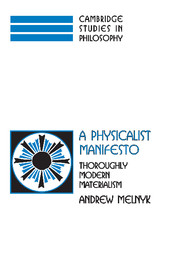Book contents
- Frontmatter
- Contents
- Preface
- Introduction
- 1 Realization Physicalism
- 2 But Why Not Supervenience?
- 3 Realizationism and R*d*ct**n*sm
- 4 Causation and Explanation in a Realizationist World
- 5 The Evidence against Realization Physicalism
- 6 The Evidence for Realization Physicalism
- References
- Index
- Titles in the series
3 - Realizationism and R*d*ct**n*sm
Published online by Cambridge University Press: 02 September 2009
- Frontmatter
- Contents
- Preface
- Introduction
- 1 Realization Physicalism
- 2 But Why Not Supervenience?
- 3 Realizationism and R*d*ct**n*sm
- 4 Causation and Explanation in a Realizationist World
- 5 The Evidence against Realization Physicalism
- 6 The Evidence for Realization Physicalism
- References
- Index
- Titles in the series
Summary
INTRODUCTION
The purpose of this chapter is to defend answers to a pair of questions of which the first is this:
Is realization physicalism reductive? That is, does it entail the reducibility of the nonphysical to the physical (given plausible additional premises concerning, say, the character of reducibility)?
My answer to question (1) is that we need to distinguish between importantly different senses of “reduction” and its cognates and that, although realizationism turns out to be nonreductive in some of these senses, it turns out to be reductive, and importantly so, in others. If this answer is right, then realization physicalism opposes the drift of nearly all the prophysicalist literature of the past twenty-five years, which has been toward a version of physicalism intended not to be reductive in any important sense (see, e.g., Fodor 1974, Boyd 1980, Post 1987).
There is, however, an almost universal consensus within professional philosophy that reductionism of pretty much any kind is false; there is also passionate opposition to reductionism from a wider intellectual public. Hence, given my answer to (I), I need also to address this second question:
(2) How damaging are the reductionist commitments of realization physicalism?
My answer to question (2) is that the forms of reductionism to which realizationism is committed are at least not open to armchair objections – objections that are a priori or based on empirical evidence available to a casual observer.
- Type
- Chapter
- Information
- A Physicalist ManifestoThoroughly Modern Materialism, pp. 71 - 122Publisher: Cambridge University PressPrint publication year: 2003



